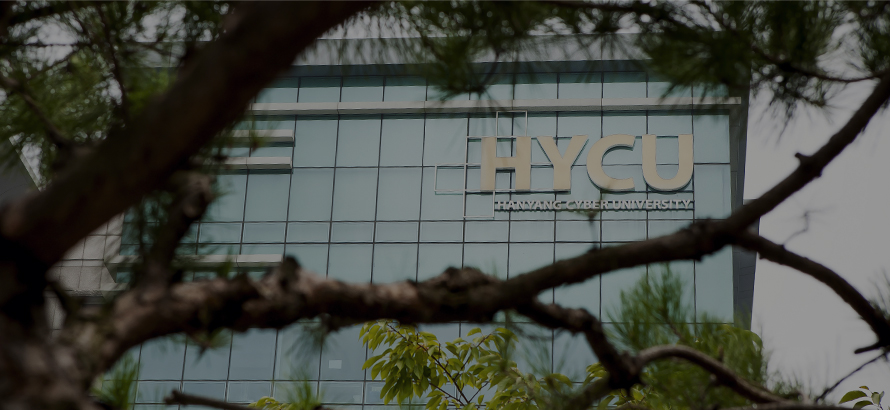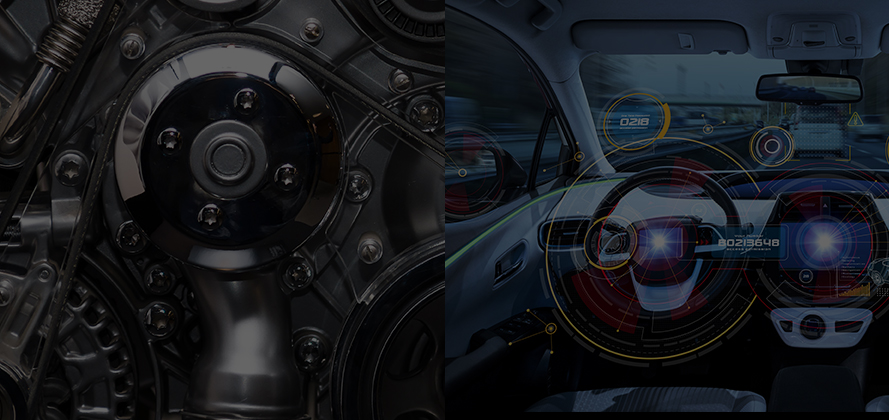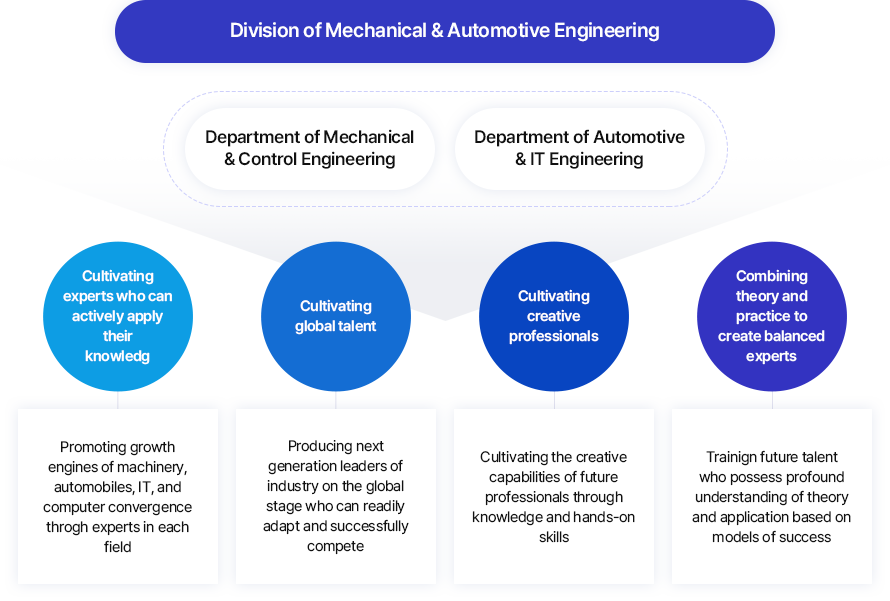Online Education Program for Creative Talent
Be the true leader of this era who practices love.
Cultivating creativity and practical skills in our students in response to demands from the IT high-tech industry
Our aim is to develop talented graduates who possess the knowledge and skills needed to lead the future of the industry through a systematic and professional understanding of the mechanical and automobile engineering fields. This is particularly important as these are among the core technologies that drive Korea’s industrial competitiveness.
Educational Objective
Cultivating practically minded, talented leaders
who can play leading roles in the future of
the mechanical and
automotive engineering industries
Through the convergence of mechanical and automotive engineering and IT, we provide a curriculum designed to provide our students a balance of theoretical knowledge and practical skills in the field of mechanical engineering. This is in order to nurture them to become talented professionals who possess creativity and the ability to innovate as future leader in their field.
Purpose of Establishment
To develop systematic and future-oriented,
new departments that can meet the
demands of rapid industrial change
- 2013
Selected as a “Specialized Business Department” of Cyber University
- 2014
Established Department of Automotive IT Convergence Engineering
- 2015
Selected as "Noteworthy New Department” by the Seoul Metropolitan Office of Education
- 2016
Newly established Department of Mechanical Control Engineering
Division of Mechanical and
Automotive Engineering Professor’s Q&A

Mechanical and Automotive Engineering
The convergence of rapidly developing machinery, automobiles, IT, and computer technologies will be a key means for future growth engines.
Can you describe the Division of Mechanical and Automotive Engineering?
“There is a field called mechatronics which is the convergence of machines and electronics. However, I thought it might sound too unfamiliar in Korea, so I decided to use mechanical control engineering instead. Control refers to IT convergence which involves mechanical and automotive engineering and IT. Therefore, the Department of Automotive IT Convergence Engineering was established by recognizing that technology convergence is an important field will increasingly determine future growth. Based on our online education know-how, we provide a curriculum designed to help our students thoroughly understand specialized theories and exercise practical skills in the fields of machinery, automobiles, and IT. We aim to train talent specialists who can play leading roles by tapping into their creativity and apply the knowledge they have gained.
What are the characteristics of the division?
“First of all, students can study subjects that are broad and faithful to the basics. A great feature is our competent professors who have academic backgrounds and practical skills. Our full-time professors have theoretical and practical experience, and we also have professional researchers from national and industrial research institutes. In addition, we invite industry professionals to provide special lectures, while we are also hire adjunct professors from the industries of machinery, automobiles, and IT convergence in order to provide realistic education and practical knowledge of actual work in the field.”
What are the prospects for graduates of the division?
“The basis for automobiles, shipbuilding, aerospace and robots, mechatronics, and green energy is mechanical engineering. Mechanical engineering is a department where students learn not only the designs and production of machines necessary in everyday life, but also advanced technologies such as those in the field of automobiles, high-speed trains, satellites, energy, robots, artificial organs, and nanotechnology. Machines are increasingly needed in all engineering industries and will continue to be become more advanced in the future. Thus, mechanical engineering will continue to be in the spotlight. With the advent of the 4th industrial revolution, there is more convergence of different industries such as automobiles, energy, and shipbuilding all centered on engineering technology. The vision of the Department of Automotive IT Convergence Engineering and the IT Convergence Technology Division is to play a pivotal role in creating new industries and markets by focusing on cost reduction, productivity improvement, and eco-friendly technology development through the synergy of new technologies and the creative convergence of existing industries.”
How can students engage in hands-on experience with cyber lectures?
“We use the electude simulator training course. We also use a simulation-based online training module. Due to the nature of a cyber university, we have a lot of site workers but they learn a lot of things naturally through the contents learned at school and experiences in the field. In addition, through an MOU with Hanyang University's College of Engineering, we are planning to conduct a number of special lectures so that students can do experiments and practice their skills offline.”
What are the career paths for students after graduation?
“Students can pursue graduate school programs at home or abroad, or they can find employment in machinery and automobile related industries. With the theoretical knowledge and practical experience they gain with their Mechanical Control Engineering major, students can actively contribute in various fields as a mechanical engineering experts. Since the Department of Mechanical Control Engineering is the foundation of all engineering industries, students can advance into the fields of automobiles, shipbuilding, aircraft, plant, heavy industries, electronics, and construction. Meanwhile, students in the Department of Automotive IT Convergence Engineering can seek careers in broader fields including new power industry, IoT, and ICT, going beyond the existing automotive field.”
A message to applicants of the Department of Mechanical and Automotive Engineering
“I would like to encourage prospective students to think digitally but feel analog, which is a balance between new and old. Digital is either 0 or 1 but living by thinking only in extremes can make people unhappy. Still, living only in the past, like an analog device, can likewise create dissatisfaction. However, when we live with a balance between both, we can become assets in promising industries in the future.”
Customized Education for Students
The convergence of rapidly developing machinery, automobiles, IT, and computer technologies is expected to become a key for factor for future growth engines. The Department of Mechanical and Automotive Engineering is devoted to cultivating professionals with practical skills through a curriculum that is divided into two departments: Mechanical Control Engineering and Automotive IT Convergence Engineering. Our outstanding faculty members provide up-to-date education based on proven cyber technology in the engineering field to help students develop into quality professionals in their field of expertise.
Detailed Major Courses
The curriculum of the Division of Mechanical and Automotive Engineering is organized in stages according to the degree of difficulty of each subject and the degree of connection and convergence with practical work.
The Department of Mechanical Control Engineering is divided into three stages: basic, core, and advanced, and four major subjects, while mechanics, statics, design, automatic control, and mechatronics are included in the curriculum. This allows students to acquire a firm background in theory and to develop practical skills, in order to cultivate them into creative individuals with the ability to put theory into practice.
The curriculum of the Department of Automotive IT Convergence Engineering consists of subjects such as mechanical and automotive design, and employs automotive IT technology and students choose one of three tracks: Electric Vehicle, Intelligent Vehicle, and IT Software. This allows students to acquire a firm grasp of foundational theory which will be helpful in their role in the future automobile industry while increasing their ability to apply convergence technology.
Support Benefits and Education Features
In the Department of Mechanical and Automotive Engineering, the curriculum followed by the faculty are based on their experiences in the field at home and overseas. In addition, educational infrastructure is shared between Hanyang Cyber university and Hanyang University and the Graduate School of Engineering, and through this relationship, students can get assistance in obtaining national certificates in the field of machinery and automobiles, employment, or enrollment in leading domestic or international graduate schools through individual career counseling and CDP programs. Also, through active offline activities, students can participate in major-related competitions to gain practical experience, and cab deepen their understanding through offline special lectures.
Characteristics of Education Infrastructure
- Premium educational contents from top professors at home and abroad
- Credit exchange with Hanyang University
- Individually tailored career counseling and CDP program operation
- Career management and employment support
- Guidance on advancing to renowned online or offline graduate schools at home or abroad
- Support for participation in various major related competitions in Korea
- Cultivate knowledge and strengthen expertise through the practical curriculum
- Student welfare benefits and start-up training through the in-school start-up support group

HYCU ON/OFFLINE
Programs
- Professional education infrastructure
- Informative lectures by professors combining theory and practice
- Continuous improvement of lecture quality through introduction of lecture development management system
- Systesmatic and Detailed Curriculum
- Providing systematically designed curriculum through tracks within two departments
- Providing simulation-based online practice modules
- Preparation Course for Certificates and Graduate School
- Support for 1:1 counseling when entering a domestic graduate school or studying abroad
- Support to acquire major-related certificates and for studies
- Support for Student-tailored Online Learning
- Lectures by type according to learning situation including self-study type and practice type
- Flexible classes that allow for both work and studies
- High-quality Liberal Arts Subjects
- Professionally created educational contents in five areas, including the humanities and social science
- Availability of practical subjects including obtaining certificates and utilizing programs
Professional Networks OFFLINE Support System
- Master's and Ph.D. degrees
- Linked with Hanyang University Graduate School of Engineering for the curriculum
- Guidance on admission to renowned domestic and foreign graduate schools such as Hanyang University and Sejong University
- Support for Employment through Industry-academia Cooperation
- Establishment of industry-university cooperation with 613 leading domestic companies
- Exchanges with experts through support from corporate education programs
- Support for Intensive Majors
- Promotion of practical experience through simulator-based curriculum and special lectures on practical experiences
- Intensification of major through participation in various competitions and study support available
- Strengthening Business Networks
- Sharing business experiences through undergraduate clubs and alumni meetings
- Broadening perspectives of the industry by inviting outside experts from relevant industries
- Other Benefits from the Hanyang University Foundation
- Discounts on medical treatment for students and family members when using the Hanyang University Medical Center
- Support for credit exchange with Hanyang University and use of various facilities



